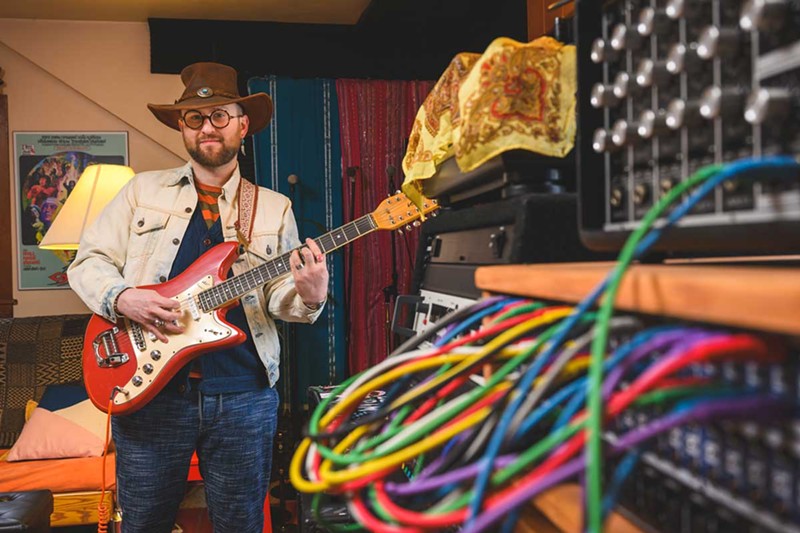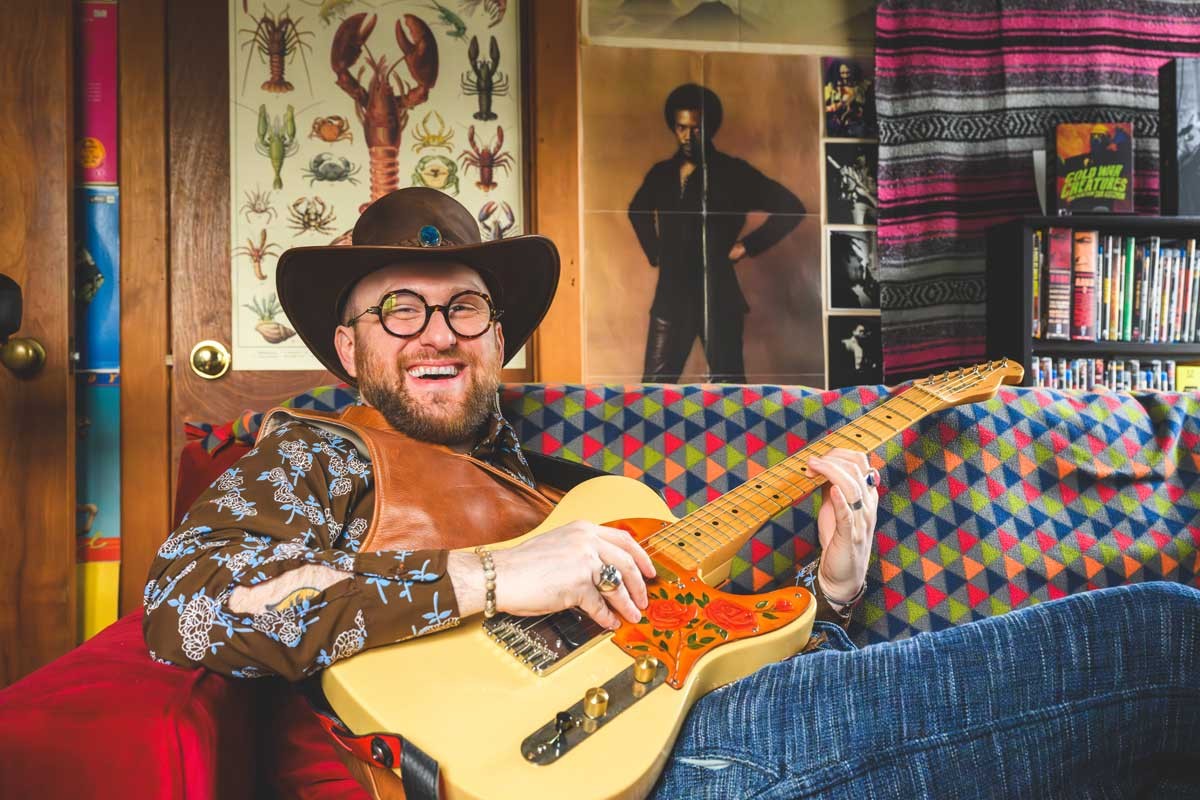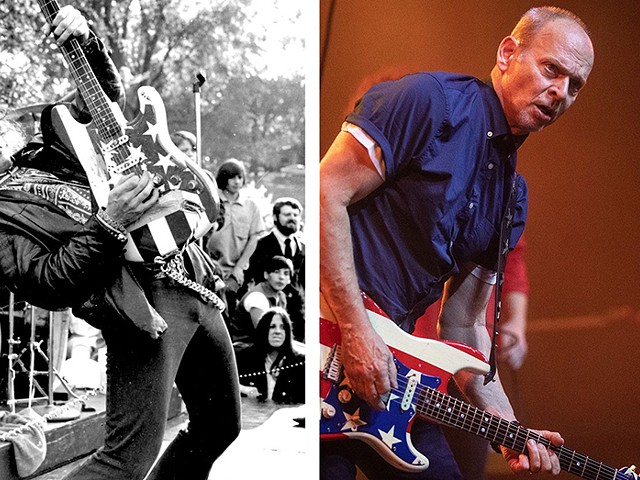Packed with books, instruments, music equipment, spiritual energy, and the smell of incense and chai, Evan Haywood’s Ann Arbor studio is a vibe, much like the artist himself. It’s unpretentiously located in a trailer park, with an interior that is nice and dreamy.
Sitting at a booth in his kitchen, the artist tells me about the journey to his upcoming release of live album Canterbury Tales, an archival record of performances that took place in Ann Arbor, Ypsilanti, and Detroit from 2014-2018.
Its release date is his birthday, Feb. 9, which is fitting as the album highlights an important period in the musician’s career and marks 20 years of him being a part of Michigan’s music scene.
Haywood says he has been into music since he could walk, with his first performance happening in kindergarten, and a stint in the Boychoir of Ann Arbor from ages 8-12. The artist went on to his first paid gig at the Music Hall in Detroit at age 13. He put the money toward purchasing his first guitar, a Gibson SG, which kickstarted his music journey and can even be heard on the upcoming project.
Many know Haywood from hip-hop trio Tree City, which started in 2005 and still plans to release music together. The musician says that the hip-hop genre dominated his life for a decade, connecting him with his current network of producers, singers, designers, and showbookers. In 2016, Haywood released his debut solo album Ramshackles, which showcases a psychedelic folk vibe that the new LP is reminiscent of.
2024’s Canterbury Tales showcases the years following Haywood’s initial project, a time which he says was crucial in his development as an artist.
“Those recordings have finally matured enough to the point that I understand them fully,” he says. “I’ve done everything I can with it and I am happy with the results. This is a cool record of a period of time when I was just driving around city to city once or twice a week and doing gigs in every bar in Michigan.”
Canterbury Tales, to Haywood, is a spiritual travelog of sorts, with sounds of rock ’n’ roll, electric blues, and spiritual jazz — alongside “a feeling of nostalgia,” he says. Influences include MC5, Sonic Youth, Sun Ra, and Alice Coltrane.
“I want somebody to hear this and not know if it came out in 1968 or 2024 and I think a lot of people won’t know when they first hear it because it has that timeless quality to it,” Haywood says. “I want people to hear this music and I want it to touch them in an internal place that they might not even be aware is there, that can help them to trigger some evolution in their own journey. I want it to be a catalyst for somebody to examine and explore their own experience.”
For Haywood, creating the album did just that, allowing him to express his emotions and hear them again throughout the years to continue understanding himself even more. Similarly, the three venues and Michigan cities where the album took place also represent unique pieces of Haywood’s artistry.

The first seven tracks on the album were recorded straight to cassette during one of Haywood’s first-ever performances, which happened in Ann Arbor in 2014 at Canterbury House. The spot is a “small intimate space,” that provided Haywood with a “personal, direct way to play acoustic music.”
“That I felt represented the acoustic side and that was a venue that I felt comfortable opening up with those songs for the first time to an audience,” he says. “I’m glad [the album] has both extremes. It has the noise and the fuzz and the craziness but it also has the calm and the peacefulness and those are both sides of who I am as an artist.”
The eighth track on the album was part of a project for Ypsilanti songwriter Matt Jones, and was recorded in an unfinished basement in “one take, with one mic,” Haywood says.
The final four tracks were the most high-level, recorded live at Third Man Records in Detroit in 2018. “Playing there was really significant because I grew up being a huge White Stripes fan. I really felt like I had to bring it that night and my band and I were just very synced in,” Haywood says. “I really had to express some things that night and I had to expel some things out of myself spiritually and I had an opportunity to do that with an audience who was willing to take that journey with me, so I had a great time.”
The night was one of Haywood’s last loud rock performances and was somewhat of a magical full-circle moment for the musician, who is now moving away from performing and toward being a “label boss” and studio manager.
The bittersweet transition is due to Haywood being diagnosed with Ménière's Disease in 2018, an inner ear condition that causes extreme vertigo and hypersensitivity to sound, as well as long-term permanent hearing loss.
“When I heard that, I had to reevaluate what I was doing with my life and my art and all those things. I feel like while I have my hearing, I want to just create as much beauty as I can and facilitate the creation of as much art as I can,” Haywood says. “After going through many hearing examinations, the resulting increase in my awareness of different frequencies in the audio spectrum has helped me to evolve and mature as a music producer.”
However, it also resulted in Haywood making a decision to move away from live shows. “I have no plans to perform for the foreseeable future,” he says.
So, in 2020, Haywood opened multi-genre recording studio Black Ram Treehouse and started record label Black Ram Sound. Having his own site for musical creation allows Haywood to control all of the sounds that go into his ears so he can protect his hearing for as long as possible.
“If my hearing does totally go and I can’t hear anything in 20 years, I’ll have a bunch of
records out and I’ll start writing books at that point or I’ll start making films. I always will find a way for my creativity to overcome any obstacles I might be dealing with,” says Haywood, who is also a visual artist. “I’m actually very thankful for the fact that I have this illness because it made me reconsider all of my priorities, and it’s what made me take the jump to invest my entire life savings in building the studio.”
So far, the record label and studio work has been going well, Haywood says, despite limited resources for music administration. While Haywood may not have a wealth of funding though, he does have a wealth of connections to people in the local creative scene.
“There are a lot of musicians, there’s a lot of beautiful, beautiful music being created all the time in somebody’s basement, in Ann Arbor, in Ypsi, in Detroit, in Hamtramck, everywhere else, but there aren’t a lot of people doing the managing and a lot of the people who are doing the managing are not people you want to be trusting with your money,” Haywood says.
“I’m very thankful to the Michigan music community for accepting me and allowing me to do whatever I want to do,” he adds. “That’s so valuable and so crucial and so hard to find in a music industry context, so that is what I’m trying to kind of create with this label, is a new context, where that sort of togetherness and fellowship that we all have shared over the last 20 or so years that I’ve been playing music, can really be represented in a tangible form. I feel like there’s so many connections and so many relationships and great, great friendships and collaborations and things that I’m just really glad that I was able to work with the caliber of people that I have been able to work with because they make me better all the time.”
Haywood says that a main goal of his is to “promote compassion between human beings,” and that once he knows what his goals are, he pretty much won’t stop until he reaches them.
“At the end of the day, I’m just really happy to be sharing music with people,” he says. “I just want people who will enjoy it to hear it. I used to make such a grandiose thing about every release and at this point, I have so much music to release that I’m just gonna keep putting things out and if people enjoy them, then that’s all I’m looking for.”
Subscribe to Metro Times newsletters.
Follow us: Google News | NewsBreak | Reddit | Instagram | Facebook | Twitter








